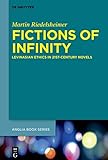Fictions of Infinity : Levinasian Ethics in 21st-Century Novels / Martin Riedelsheimer.
Material type: TextSeries: Buchreihe der Anglia / Anglia Book Series ; 71Publisher: Berlin ; Boston : De Gruyter, [2020]Copyright date: ©2020Description: 1 online resource (X, 246 p.)Content type:
TextSeries: Buchreihe der Anglia / Anglia Book Series ; 71Publisher: Berlin ; Boston : De Gruyter, [2020]Copyright date: ©2020Description: 1 online resource (X, 246 p.)Content type: - 9783110712346
- 9783110712421
- 9783110712407
- 809/.93511160905 23
- online - DeGruyter
- Issued also in print.
| Item type | Current library | Call number | URL | Status | Notes | Barcode | |
|---|---|---|---|---|---|---|---|
 eBook
eBook
|
Biblioteca "Angelicum" Pont. Univ. S.Tommaso d'Aquino Nuvola online | online - DeGruyter (Browse shelf(Opens below)) | Online access | Not for loan (Accesso limitato) | Accesso per gli utenti autorizzati / Access for authorized users | (dgr)9783110712407 |
Browsing Biblioteca "Angelicum" Pont. Univ. S.Tommaso d'Aquino shelves, Shelving location: Nuvola online Close shelf browser (Hides shelf browser)
Frontmatter -- Acknowledgements -- List of Abbreviations -- Contents -- 1. Introduction: Towards Infinity -- 2. Narrative Infinity: Aesthetics and Conceptualisation -- 3. Levinas and the Ethical Aporia of Infinity -- 4. Infinitely Encountering the Ineffable: David Mitchell’s Cloud Atlas -- 5. Infinitely Repeating: Jeanette Winterson’s The Stone Gods -- 6. Infinite Intertextuality: Encountering Alterity in Ian McEwan’s Saturday -- 7. Infinite Perspective: John Banville’s The Infinities -- 8. Coda: And Beyond? -- Works Cited -- Index
restricted access online access with authorization star
http://purl.org/coar/access_right/c_16ec
This study traces the connection of infinity and Levinasian ethics in 21st-century fiction. It tackles the paradox of how infinity can be (re-)presented in the finite space between the covers of a book and finds an answer that combines conceptual metaphor theory with concepts from classical narratology and beyond, such as mise en abyme, textual circularity, intertextuality or omniscient narration. It argues that texts with such structures may be conceptualised as infinite via Lakoff and Núñez’s Basic Metaphor of Infinity. The catachrestic transfer of infinity from structure to text means that the texts themselves are understood to be infinite. Taking its cue from the central role of the infinite in Emmanuel Levinas’s ethics, the function of such ‘fictions of infinity’ turns out to be ethical: infinite textuality disrupts reading patterns and calls into question the reader’s spontaneity to interpret. This hypothesis is put to the test in detailed readings of four 21st-century novels, David Mitchell’s Cloud Atlas, Jeanette Winterson’s The Stone Gods, Ian McEwan’s Saturday and John Banville’s The Infinities. This book thus combines ethical criticism with structural aesthetics to uncover ethical potential in fiction.
Issued also in print.
Mode of access: Internet via World Wide Web.
In English.
Description based on online resource; title from PDF title page (publisher's Web site, viewed 25. Jun 2024)









